Ukraine crisis: Gunfire and explosions as Crimean base is stormed by Russian troops
Kim Sengupta reports from amid the gunfire and explosions during the seizure of Belbek military airport
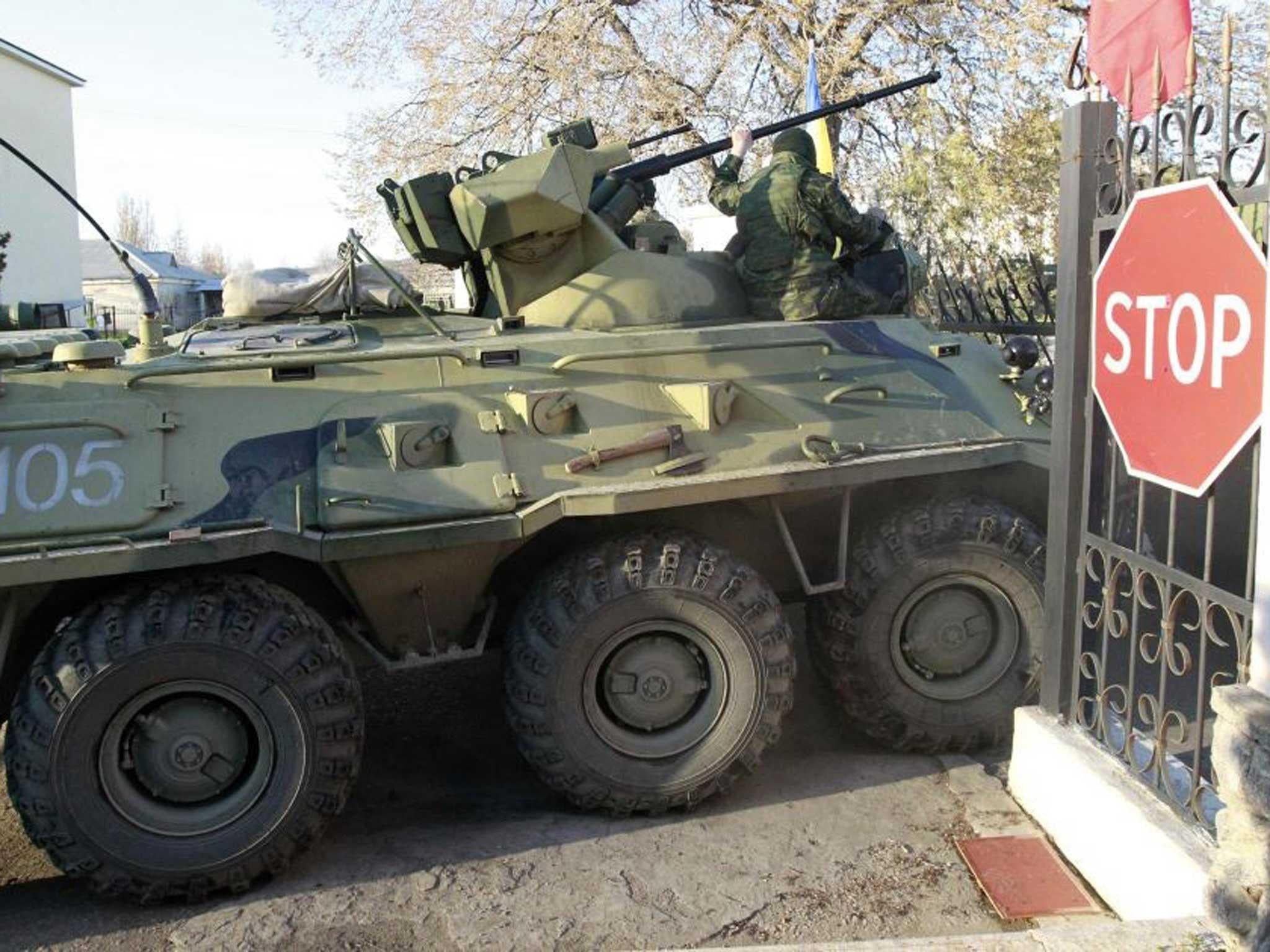
Your support helps us to tell the story
From reproductive rights to climate change to Big Tech, The Independent is on the ground when the story is developing. Whether it's investigating the financials of Elon Musk's pro-Trump PAC or producing our latest documentary, 'The A Word', which shines a light on the American women fighting for reproductive rights, we know how important it is to parse out the facts from the messaging.
At such a critical moment in US history, we need reporters on the ground. Your donation allows us to keep sending journalists to speak to both sides of the story.
The Independent is trusted by Americans across the entire political spectrum. And unlike many other quality news outlets, we choose not to lock Americans out of our reporting and analysis with paywalls. We believe quality journalism should be available to everyone, paid for by those who can afford it.
Your support makes all the difference.Russian armour smashed into the base of Ukrainian troops on Saturday in the first serious military action between the two countries in the confrontation over Crimea.
Machine guns and stun grenades were used in the assault by Russian soldiers as they ended the siege of Belbek military airport in a brutal show of power. The commander of the base, Colonel Yuli Manchur, who had led his men in defying repeated demands for surrender, was arrested and taken away.
I saw the attack, which came at 4.48pm when three armoured personnel carriers (APCs) punched a hole through the perimeter wall of the base, followed by soldiers in balaclavas streaming in.
There were bursts of automatic fire and loud explosions as the troops surged through. The Ukrainians had locked away their weapons and stood unarmed as the Russians, among them Spetznaz special forces in black, began to surround them.
A little later, the main gate of the base had also been punctured by APCs, cutting off any means for those inside to get away. There were several casualties among the Ukrainians, at least one believed to have been hit by a Russian vehicle.
The Ukrainians lined up. They faced Russian troops eight feet away, with ballistic shields and guns aimed at them. Just beyond, an APC pointed its barrel at the defenders. The two sides shouted at each other with insults soon flying.
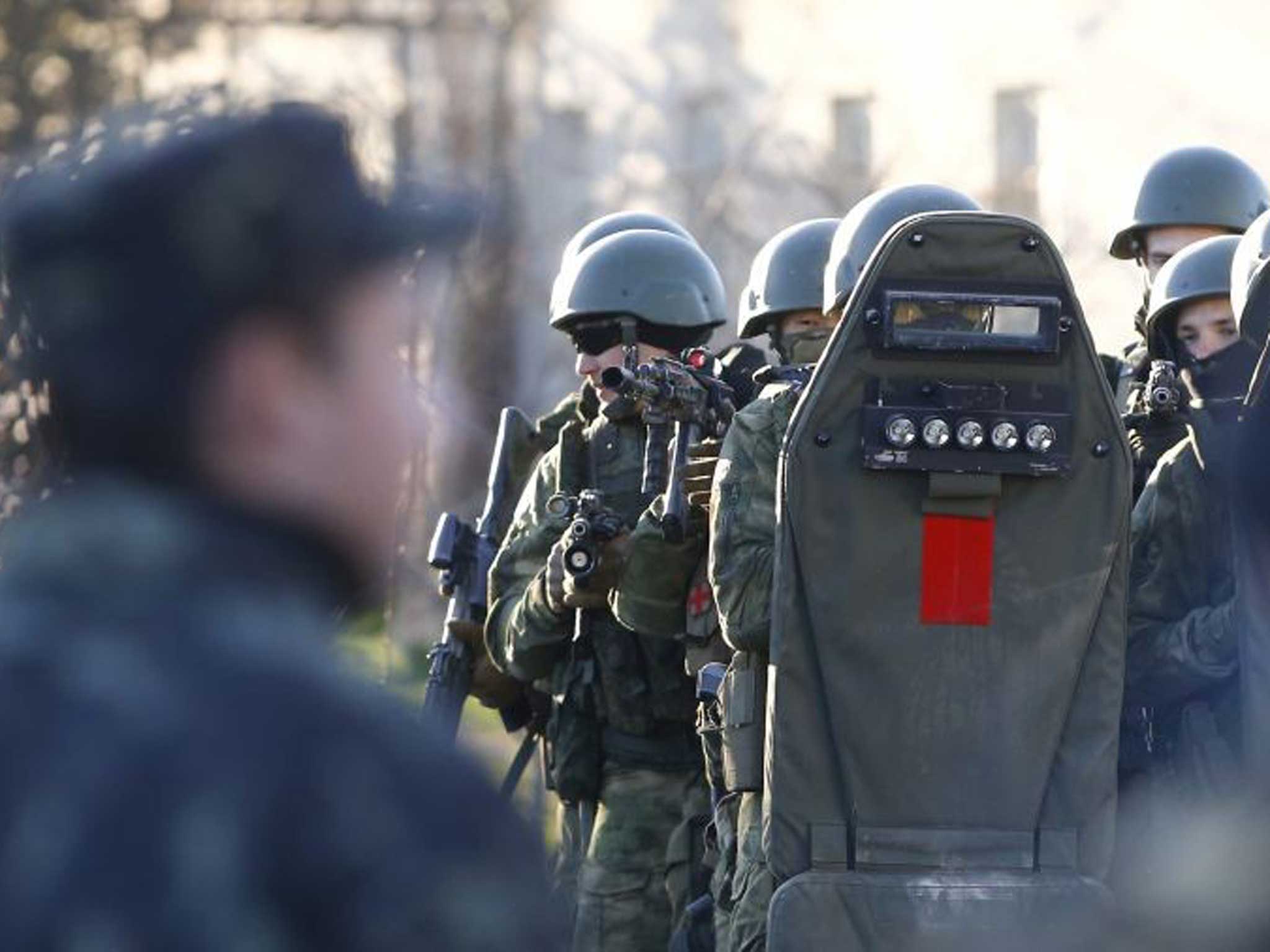
One Russian officer, apparently trying to calm the situation, shouted: “It’s OK, no more shooting, you’re safe.” The ripostes ran: “You are making us safe by attacking us?! We are here without guns, why are you hiding behind guns and your masks?”
While the Russian troops carried out their assault, gangs of the “Self Defence Force”, the paramilitary raised by the separatist Crimean government, had gathered outside. The Ukrainian soldiers began to get telephone calls from their families saying that their apartments, just outside the perimeter wire, were being broken into. One soldier, Corporal Aleksei Timorenko, turned to me and said: “See how brave they are! They let the Russians do their fighting for them, and rob women and children.”
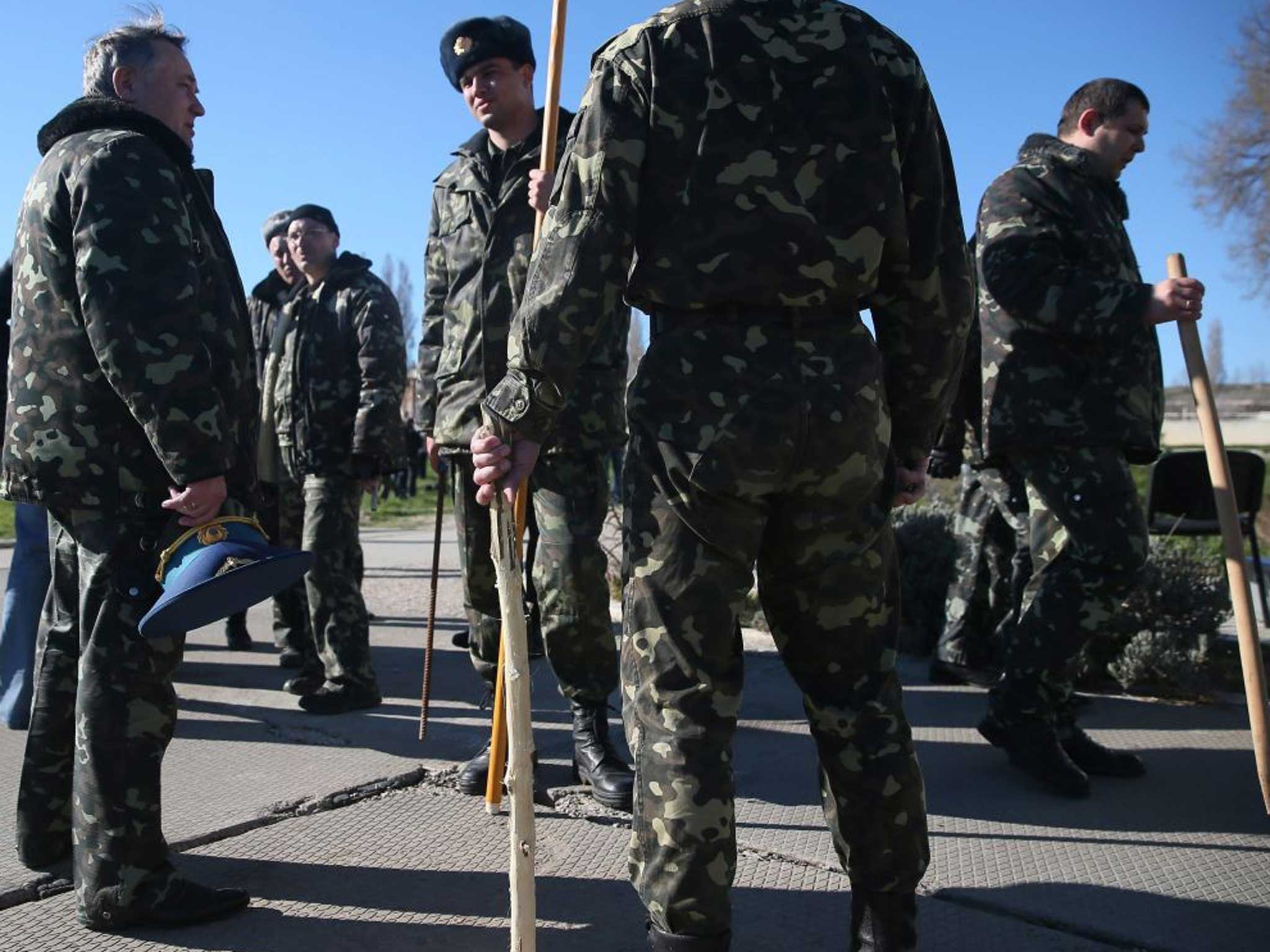
As more and more Russians came in, Col Manchur called his men to attention and led them in singing the national anthem. The Russians, in combat stations, watched in silence as the verses were roared out, followed by full-throated cries of “Glory to Ukraine, Glory to our Heroes”. Col Manchur then told his men: “You have done all that honour demands. You should be proud of yourselves, I am proud of you.” He had, he said, been summoned to a meeting with senior officers and he would, if he could, come back and tell them what had been agreed.
The stance of the Belbek commander over the three weeks in which he had resisted demands to surrender, had made him a hate figure among Russian nationalist separatists. His wife, Larissa, had described earlier in the day how she had seen posters in Sevastopol demanding that her husband be executed for his supposed treachery.
Asked whether he would be safe, Col Manchur responded: “I don’t know, we will see.”
Afterwards, the Russian troops took the media out through the hole created by their armour; photographers and camera operators had memory cards taken away from them, although some managed to smuggle them out. One Russian soldier, his face covered by a bandana, said in broken English: “I am sorry, but I am doing my job, you are doing yours. We are soldiers, it’s the politicians. Ukraine, Russia ... friends.”
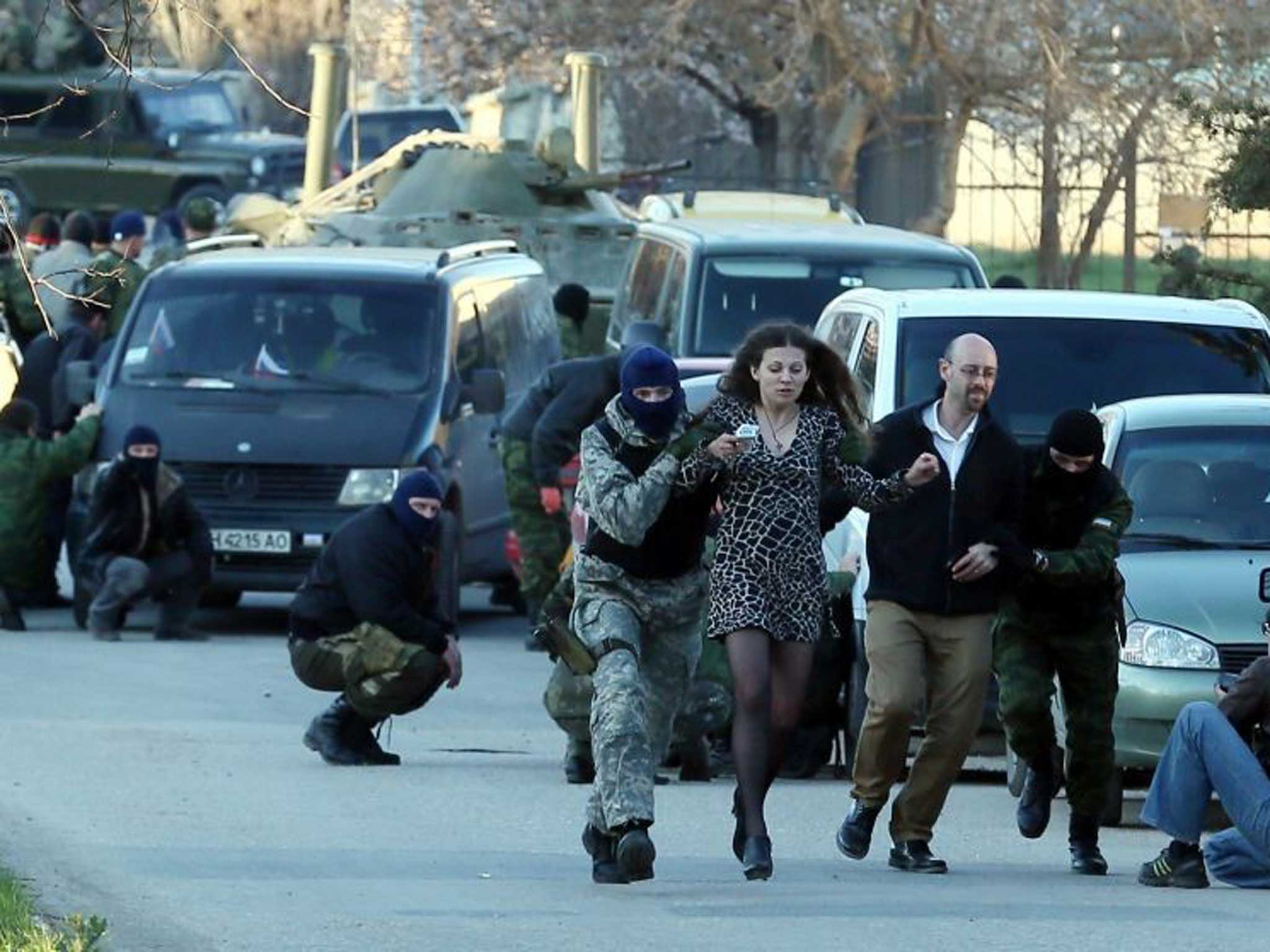
As we left, with the light fading, the Ukrainian troops were once again lined up, this time at the instructions of the Russians. Every journalist leaving shook the colonel’s hand, a few had seen his obstinate refusal to give up against overwhelming odds.
Major Vladislav Korgic, a Ukrainian fighter pilot, spoke of the anxiety the men felt for their families. He had spoken to me before about how his seven-year-old daughter would have to be moved from the local school because of his presence in the base, and how his wife had faced abuse from Russian nationalists.
“Of course, we are very, very concerned. I have just spoken to my wife, she is frightened for me,” he said. “I am just thinking about her and my daughter. This is a very, very bad situation for everyone, I don’t know how it’s going to end.”
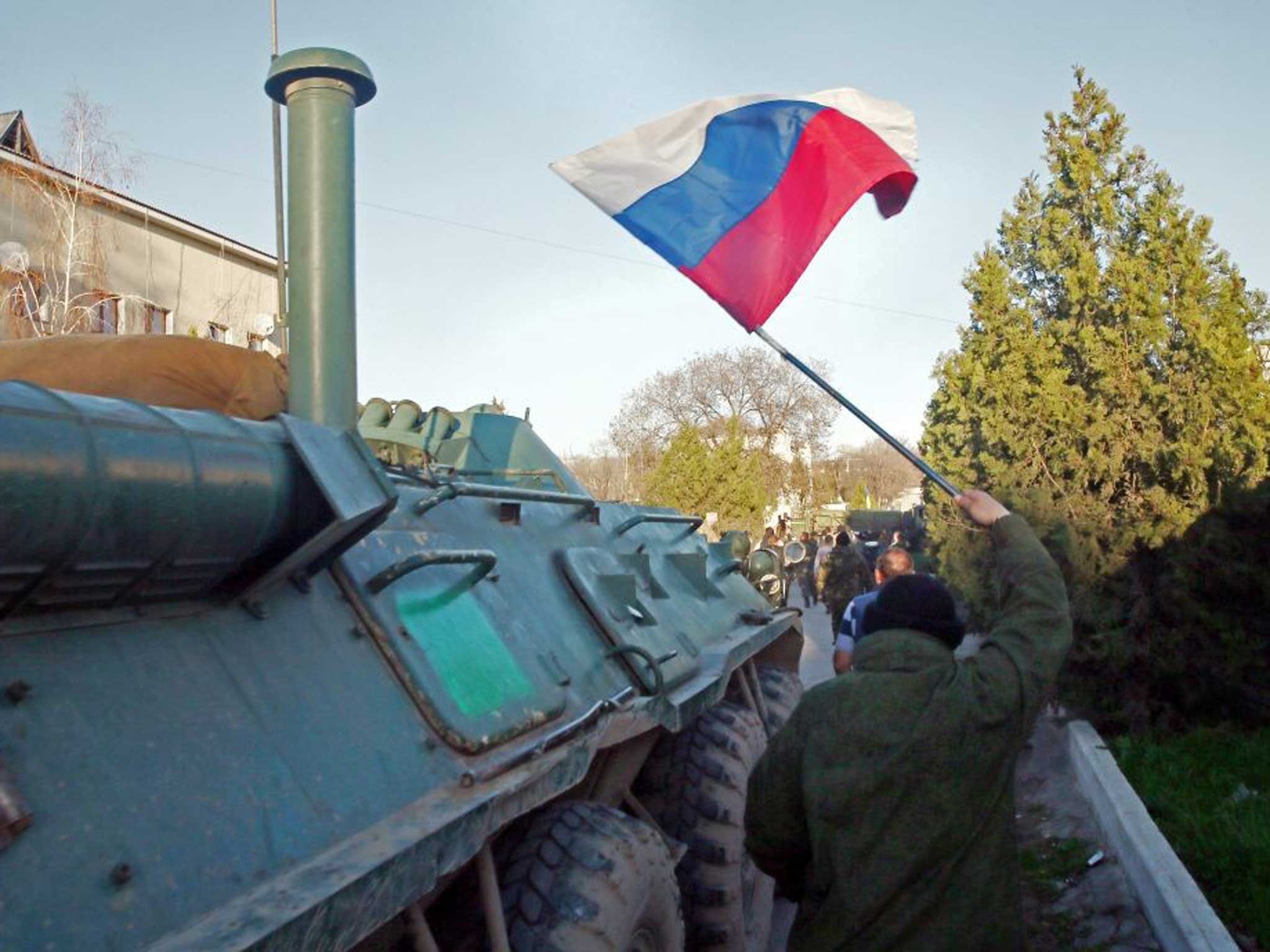
A video camera had been installed at the main gate of the base, accessible on the internet. Members of the Self Defence Force tried to shoot it down, before wrenching it off to loud cheers of “Russia, Russia!”. Any outside scrutiny of what was going to happen to the base in the falling darkness was gone.
The scenes were in stark contrast to those earlier in the day when, under a sky of azure blue, with apple blossom drifting in the air, two young officers, lieutenants Galina Vladimirova Volosyanick and Ivan Ivanovich Benera, got married. Local champagne and lemonade, figs and nuts, chocolates and cakes, had been laid out on a long trestle table covered with a bright golden plastic cover. Toasts were drunk; troops clapped and whistled as the bride and groom kissed each other.
Col Manchur, as the commanding officer, had presided over the ceremony. He wished them happiness and strength in the uncertain times that lay ahead.
Join our commenting forum
Join thought-provoking conversations, follow other Independent readers and see their replies
0Comments